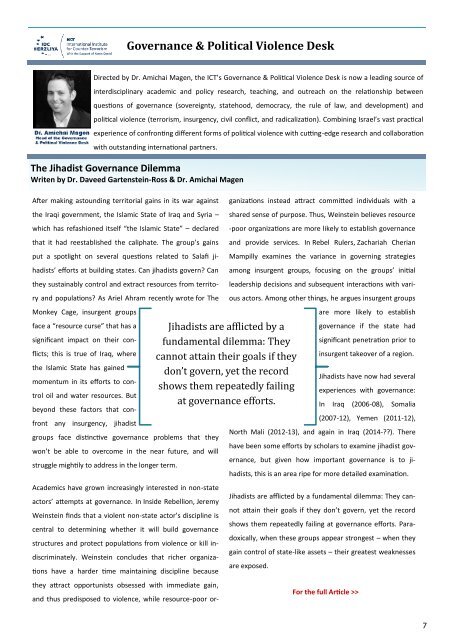ICT-Newsletter-Issue2
ICT-Newsletter-Issue2
ICT-Newsletter-Issue2
You also want an ePaper? Increase the reach of your titles
YUMPU automatically turns print PDFs into web optimized ePapers that Google loves.
Governance & Political Violence Desk<br />
Directed by Dr. Amichai Magen, the <strong>ICT</strong>’s Governance & Political Violence Desk is now a leading source of<br />
interdisciplinary academic and policy research, teaching, and outreach on the relationship between<br />
questions of governance (sovereignty, statehood, democracy, the rule of law, and development) and<br />
political violence (terrorism, insurgency, civil conflict, and radicalization). Combining Israel’s vast practical<br />
experience of confronting different forms of political violence with cutting-edge research and collaboration<br />
with outstanding international partners.<br />
The Jihadist Governance Dilemma<br />
Writen by Dr. Daveed Gartenstein-Ross & Dr. Amichai Magen<br />
After making astounding territorial gains in its war against<br />
the Iraqi government, the Islamic State of Iraq and Syria –<br />
which has refashioned itself “the Islamic State” – declared<br />
that it had reestablished the caliphate. The group’s gains<br />
put a spotlight on several questions related to Salafi jihadists’<br />
efforts at building states. Can jihadists govern Can<br />
they sustainably control and extract resources from territory<br />
and populations As Ariel Ahram recently wrote for The<br />
Monkey Cage, insurgent groups<br />
face a “resource curse” that has a<br />
significant impact on their conflicts;<br />
this is true of Iraq, where<br />
the Islamic State has gained<br />
momentum in its efforts to control<br />
oil and water resources. But<br />
beyond these factors that confront<br />
any insurgency, jihadist<br />
groups face distinctive governance problems that they<br />
won’t be able to overcome in the near future, and will<br />
struggle mightily to address in the longer term.<br />
Academics have grown increasingly interested in non-state<br />
actors’ attempts at governance. In Inside Rebellion, Jeremy<br />
Weinstein finds that a violent non-state actor’s discipline is<br />
central to determining whether it will build governance<br />
structures and protect populations from violence or kill indiscriminately.<br />
Weinstein concludes that richer organizations<br />
have a harder time maintaining discipline because<br />
they attract opportunists obsessed with immediate gain,<br />
Jihadists are afflicted by a<br />
fundamental dilemma: They<br />
cannot attain their goals if they<br />
don’t govern, yet the record<br />
shows them repeatedly failing<br />
at governance efforts.<br />
and thus predisposed to violence, while resource-poor organizations<br />
instead attract committed individuals with a<br />
shared sense of purpose. Thus, Weinstein believes resource<br />
-poor organizations are more likely to establish governance<br />
and provide services. In Rebel Rulers, Zachariah Cherian<br />
Mampilly examines the variance in governing strategies<br />
among insurgent groups, focusing on the groups’ initial<br />
leadership decisions and subsequent interactions with various<br />
actors. Among other things, he argues insurgent groups<br />
are more likely to establish<br />
governance if the state had<br />
significant penetration prior to<br />
insurgent takeover of a region.<br />
Jihadists have now had several<br />
experiences with governance:<br />
In Iraq (2006-08), Somalia<br />
(2007-12), Yemen (2011-12),<br />
North Mali (2012-13), and again in Iraq (2014-). There<br />
have been some efforts by scholars to examine jihadist governance,<br />
but given how important governance is to jihadists,<br />
this is an area ripe for more detailed examination.<br />
Jihadists are afflicted by a fundamental dilemma: They cannot<br />
attain their goals if they don’t govern, yet the record<br />
shows them repeatedly failing at governance efforts. Paradoxically,<br />
when these groups appear strongest – when they<br />
gain control of state-like assets – their greatest weaknesses<br />
are exposed.<br />
For the full Article >><br />
7









